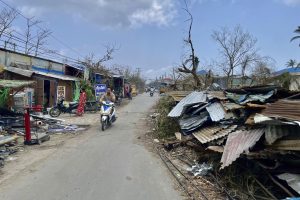A month after Cyclone Mocha made landfall in the Bay of Bengal, bringing untold destruction in its wake, the United Nations has denounced a decision by Myanmar’s military junta to block humanitarian access to regions of Rakhine state that are most affected.
In a statement issued on Monday, U.N. Resident Coordinator Ramanathan Balakrishnan condemned the military administration’s “unfathomable” decision to rescind its approval for international organizations to distribute food, shelter, and medicines for aid workers trying to reach those most in need.
“This decision is yet another devastating setback for more than a million people whom humanitarians had planned to reach with life-saving assistance in cyclone-hit Rakhine state over the weeks and months ahead,” Balakrishnan said in the statement. “Just when vulnerable communities need our help the most, we have been forced to stop distributions of food, drinking water, and shelter supplies.”
The junta’s decision was first announced by the U.N. in a situation report on June 9, a day after the humanitarian organization Medecins Sans Frontieres (also known as Doctors Without Borders) reported that its own travel authorizations for Rakhine had been suspended.
On the afternoon of May 14, Cyclone Mocha made landfall near Sittwe, the capital of Rakhine state, bringing rain and stinging winds of up to 250 kilometers per hour, devastating large parts of the coast. As Nazifa Nawar noted in these pages on June 2, “almost no house in the Rakhine state capital, Sittwe, was spared destruction.”
The cyclone has disrupted nearly every aspect of normal life in Rakhine, which had been relatively untouched by the conflict that has erupted across much of the rest of Myanmar. Winds and rain inundated farmlands, killing livestock and contaminating drinking water. The storm destroyed bridges, schools, and hospitals, and blocked roads in many parts of Rakhine.
It also took a particular toll on the hundreds of thousands of Rohingya living in internal displacement camps in Rakhine since anti-Muslim violence last decade. Even before the cyclone hit, the camps had been likened to “open prisons.” Now many of the camps have reportedly been destroyed, leaving hundreds, if not thousands, of Rohingya civilians without shelter. The cyclone is also believed to have left nearly 150 people dead in Myanmar, according to a figure reported by AFP. (The real number is very likely higher.)
Even prior to this decision, humanitarian access to the affected regions of Myanmar, particularly for international non-government organizations, was limited. The U.N. said that humanitarian workers had recently held extensive discussions with junta officials about scaling up assistance in Rakhine and other cyclone-affected areas, and had planned wider distributions for June. But the statement noted that “this has since been rescinded, pending further clearances,” effectively “paralyzing the humanitarian response.”
Prior to the suspension, more than 110,000 people across the affected areas had received shelter and other relief items since the cyclone, the U.N. said, while food assistance has reached almost 300,000 people in Rakhine.
The junta’s decision to block humanitarian access to Rakhine state, and prioritize its own political interests over recovery from the disaster, is sadly unsurprising. Fearful that allowing foreigners into storm-affected areas would undermine confidence in the military’s own widely-publicized relief efforts, a past military junta behaved in a similar manner after Cyclone Nargis hit southern Myanmar in 2008, preventing international disaster relief teams and supplies from reaching those in need. It also restricted humanitarian access to areas of northern Rakhine state in the aftermath of the military’s brutal ethnic cleansing of Rohingya populations in 2017.
The decision also demonstrates the extent to which any event or challenge in Myanmar is now colored by its unfolding civil war between the military junta, which seized power in February 2021, and the multi-sided resistance to its rule. Those suffering needlessly from this decision can now be added to the lengthy negative toll that this latest iteration of military rule has had on the country and its people.

































